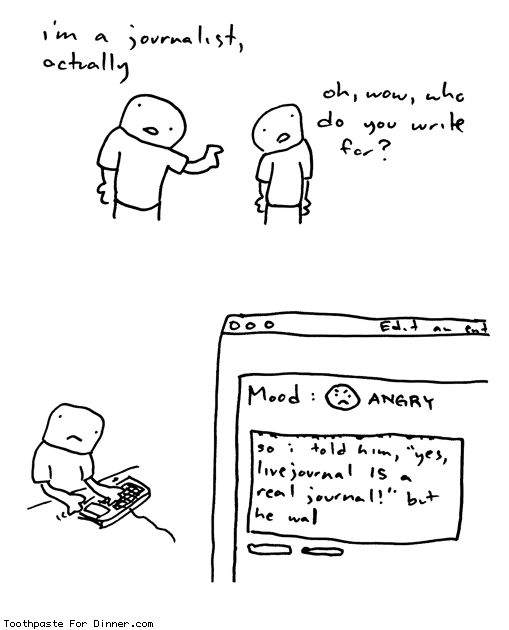It seems that one of the most pertinent questions surrounding journalism today, is who exactly is a journalist.
Journalists have long been hailed as the gatekeepers of society’s information, the ‘fourth estate’. They brandish the rights of free speech and freedom of the press, reporting on issues that are at the heart of society’s interest. Essentially, journalists inform the public, the ones who have “a right to know” (Rosen 2010).
Journalists have long been hailed as the gatekeepers of society’s information, the ‘fourth estate’. They brandish the rights of free speech and freedom of the press, reporting on issues that are at the heart of society’s interest. Essentially, journalists inform the public, the ones who have “a right to know” (Rosen 2010).
And yet, as we move further into the 21st Century, technology is continually shifting and blurring the boundaries of what journalism is and who does it. It appears that the public no longer need to rely solely on the journalist to inform them of the innate goings-on of the world around them. The public have a new source of information: each other.
Cutting out the middleman (in this case, the journalist), sites such as Twitter and the growing blogosphere are allowing the rise of the ‘citizen journalist’. That is, the public “are connected horizontally to one another as effectively as they are connected up to Big Media; and they have the powers of production in their hands” (Rosen 2010). Even sites such as YouTube are allowing people to upload videos of the news as it happens, often gaining access to images out of the reach of journalists. For example, images of the recent riots in London. Should someone who posts amateur videos of rioters on to YouTube be labelled as a journalist? This is the big question.
 |
| Above: Image taken from Toothpastefordinner |
According to Roy Greenslade, blogger and columnist for the Guardian, “while journalism does indeed matter, journalists don’t” (Greenslade 2008). This statement may seem perverse, especially coming from a man who is a professor of journalism. However there is more behind this ominous statement than the sentiment that budding journalists should start searching for a new career.
Greenslade continues, stating, “proper journalism is worth fighting for” (Greenslade 2008). Quality journalism respects the truth and ethical practice. It is this integrity that perhaps sets the citizen journalist apart from the journalist.
However, instead of allowing technology to sideline journalists, they are increasingly encouraged to embrace the digital world and even their ‘opposition’, citizen journalists. Alan Rusbridger, editor of the Guardian, believes that journalists should work in collaboration with their public: “We bring important things to the table, and so do the users” (Rusbridger 2010).
However, instead of allowing technology to sideline journalists, they are increasingly encouraged to embrace the digital world and even their ‘opposition’, citizen journalists. Alan Rusbridger, editor of the Guardian, believes that journalists should work in collaboration with their public: “We bring important things to the table, and so do the users” (Rusbridger 2010).
Definitively defining journalism and journalists is a precarious task that may take some years to achieve. In the mean time, journalists should recognise that their industry is changing and they must adapt in order to remain relevant to the technologically tuned in generations of the 21st Century.
References:
Australian Broadcasting Corporation (2008). Roy Greenslade in Conversation with Margaret Simons. Accessed 12/8/11 <http://fora.tv/2008/05/01/Roy_Greenslade_in_Conversation_with_Margaret_Simons#fullprogram>
Rosen, J (2010). The Journalists Formerly Known as the Media: My Advice to the Next Generation. Accessed 12/8/11 <http://jayrosen.posterous.com/the-journalists-formerly-known-as-the-media-m>
Rusbridger, A (2010). The Hugh Cudlipp lecture: Does journalism exist?. Accessed 12/8/11 <http://www.guardian.co.uk/media/2010/jan/25/cudlipp-lecture-alan-rusbridger>
No comments:
Post a Comment